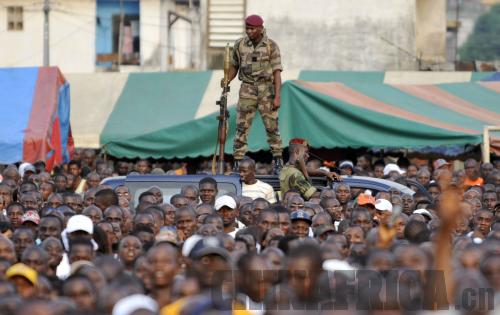|
 |
|
WATCHFUL EYE: Cote d'Ivoire troops stand guard at a Young Patriot's rally during the election stand off (XIN HUA) |
As Africa focuses on Cote d'Ivoire, the permutations are beginning to temper with what would otherwise be the norm. With an election that has produced two presidential candidates who have gone into a re-run and eventually inaugurated themselves as the substantive leader, a paradox is unfolding.
This Cote d'Ivoire case presents a typical electoral scenario across the African landscape, with vast potential to taint the continent's quest for peaceful governance processes and political maturity. There is so much at stake and yet the obsession for power can deride any attempt at progress and replace it with such magnanimous chaos as is transpiring in this great cocoa-producing African nation.
The outcome of the Cote d'Ivoire election crisis is fundamental for the fate of elections in Africa. In 2011, the continent is faced with a potential of 17 presidential elections in the following countries: Benin, Cameroon, Cape Verde, Central African Republic, Chad, Democratic Republic of the Congo, Djibouti, Egypt, the Gambia, Liberia, Madagascar, Niger, Nigeria, Seychelles, Uganda, Zambia and Zimbabwe.
The handling of this disconcerting scenario will therefore act as a benchmark for these elections and the evolution of democracy on the continent.
AU emissaries
The African Union (AU) faces a possible transformation provoked from its reaction to the situation. Firstly the AU came out clearly in support of the Quattara victory. Later the AU dispatched Thabo Mbeki, who is now tagged as their snapshot troubleshooter in political disputes across the continent. His coming into the fray was hinged mainly on the quelling of tension whilst trying to find a common way forward. Mbeki's options therefore did not seem to go beyond the inquisition of outright democracy. The AU's mission through Mbeki was immersed in mild diplomacy not meant to deal with the results of the election but the way forward out of that result. This was also influenced by the very disposition of the Cote d'Ivoire military milieu.
As the national army supports Gbagbo, New Forces fighters support Quattara who is from the Muslim north. This military ally therefore distorts any pure reliance on just the electoral figures in the negotiations. There is further consideration of any prospects of avoiding collision. Such prospects carry the temptation for the degradation of the reality of the electoral outcome in preference for anything that avoids the outbreak of civil war. In essence, Mbeki's approach seemed to consider the election result as immaterial, a feat he has once performed as the Zimbabwean crisis mediator.
Secondly, the AU dispatched Kenyan Prime Minister Raila Odinga. Those who know Odinga and the history of Kenyan politics will surely be able to realize that he is not as diplomatic and toned-down as the earlier emissary. Therefore was the AU not shifting gears toward a more offensive intervention in Cote d'Ivoire?
Gbagbo's response to Odinga's intervention still maintained some intoxicating levels of defiance. This then led to the AU dispatching yet another mediator; this time opting for Olesegun Obasanjo who again was in the forefront of the Commonwealth's hard stance on Zimbabwe which ultimately led to the country's voluntary withdrawal from that club. Obasanjo's tough Nigerian political terrain must have been some critical consideration for the AU to take into account in finding someone who would obviously try and nip ahead of the efforts so far expressed by Mbeki and Odinga. When Obasanjo left Abidjan he retorted that he was hopeful of a solution to the crisis but he did not rule out military intervention. His reflections could not have been independent of the AU who has assigned him on that mission. While Mbeki seemed to be the face of diplomacy, Odinga reflected the face of intolerance and yet Obasanjo seemed to have exhibited the face of military options.
|